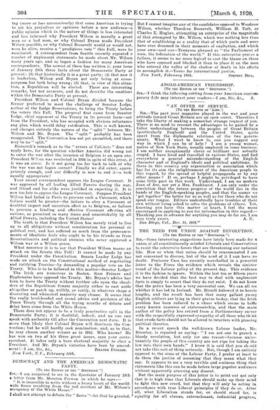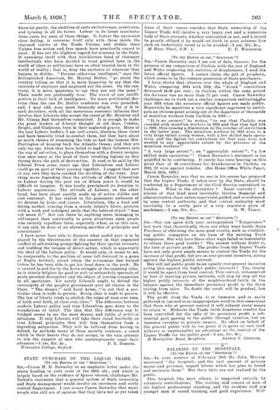THE NEED FOR UNION AGAINST REVOLUTION. [To THE EDITOR OF
THE " SPECTATOR."] SIR,—Some interesting suggestions have lately been made for a union of all constitutionally minded Liberals and Conservatives to resist the subversive forces that are threatening our national life. How or when that union should be consummated I am not concerned to discuss, but of the need of it I can have no doubt. Professor. Case has recently marshalled in a powerful letter to the Times the evidence which reveals the sinister trend of the Labour policy of the present day. This evidence it is the fashion to ignore. Within the last ten or fifteen years we have decided that the best way to deal with unpleasant facts is simply to assert that they do not exist. I do not know that the policy has been a very successful one. We can all see whither it has led in Ireland. Mr. Birrell followed it to heroic lengths, and the result has been that many gallant young English soldiers are lying in their graves to-day, that the Irish problem has been reduced to a chaos which seems to baffle every known resource of statesmanship, and that the main author of the policy has retired from a Parliamentary career with the respectfully expressed sympathy of all those who think that crude facts should not be allowed to interfere with pleasing political theories.
In a recent speech the well-known Labour leader, Mr. Bromley, is reported as saying : "I am not one to preach a bloody revolution, but only for one reason—because unfor- tunately the people of this country are not ripe for taking the law into their own hands." I know it is said that you should not take this sort of thing seriously. But, though I am entirely opposed to the aims of the Labour Party, I prefer at least to do them the justice of assuming that they mean what they say. It appears to me a very terrible and ominous thing that statements like this can be made before large popular audiences without apparently arousing any dissent.
But the main purpose of this letter is to point out not only that it is high time that Liberals should make up their mind to fight this new creed, but that they will only be acting in actordance with true Liberal principles if they do so. After all, what Liberalism stands for, or should stand for, is equality for all classes, retrenchment, industrial progress, financial purity, the abolition of caste exclusiveness, restriction, and tyranny in all its form's. Labour in its latest manifesta- tions cares for none of these things. It fosters the narrowest class feeling, it concerns itself only with those inside the charmed circles of the Trade Unions, and 'within those Unions free action and free speech have practically ceased to exist. It has not the slightest regard for economy in the State. It associates itself with that mischievous band of visionary intellectuals who have decided to treat general laws in the world of ideas as politicians have so often treated facts in the world of reality; that is, deny the existence of whatever they happen to dislike. "Persons otherwise intelligent," says the distinguished American, Dr. Murray Butler, " go about the country telling us that it is mere hypocrisy to say that the interests of employer and employed are the same. On the con- trary, it is mere ignorance to say they are not the same." These words are profoundly true. The worst of our intelli- gentsia is their lack of intelligence. No more pestilential doc- trine than the one Dr. Butler condemns was ever preached, and, I may add, none more fatuously stupid. Yet it is to such doctrines, with all the monstrous economic fallacies they involve, that Liberals who accept the creed of Mr. Bromley and Mr. Cramp find themselves committed. - It is enough to make the great leaders of Liberal thought of old days, Cobden, Bright, and Gladstone, turn in their neglected graves. Many of the best Labour leaders, I am well aware, disclaim these views and have honestly tried to combat them, but they have about as much chance of stemming the tide as had the famous Mrs. Partington of keeping back the Atlantic Ocean; and they are only too apt, when they have failed to lead their followers into the way of salvation, to place themselves with a dreary resigna- tion once more at the head of their revolting legions as they throng down the path of destruction. It used to be said by the Liberal Press some years ago that Liberalism and Labour could go on part of their journey together. I suggest that now at any rate they have reached the dividing of the ways. Any- thing more degrading than the attitude of official Liberalism to Labour during the past ten or fifteen years it would be difficult to imagine. It has loudly proclaimed its devotion to Labour aspirations. The attitude of Labour, on the other hand, has been about equally made up of active dislike and cool contempt. It has replied to the passionate embraces of its devotee by kicks and curses. Liberalism, like a fond and doting mother wincing from a sturdy infant's blows, protests with a weak and indulgent smile that the beloved object " does not mean it." But can there be anything more damaging to self-respect than continually to press attentions upon people who entirely repudiate them, especially when, as in this case, it can only be done at an alarming sacrifice of principles and convictions?
I have never been able to discover what useful part is to be played by the Government of the country in that organized conflict of self-seeking groups fighting for their special interests, and wielding the weapon of direct action, which is. apparently the ideal of the Labour polity. It would only, it seems to me, be comparable to the position of some tall forward in a game of Rugby football, round whom the scrimmage has formed tefore he has been able to get his head down in the pack. He is swayed to and fro by the fierce struggle of the opposing sides, he is utterly helpless for good or evil—a melancholy spectacle of acute personal discomfort and the object of jeering compassion to all spectators. Yet surely Liberal's ought to defend the sovereignty of the people's government over all classes in the State. " The danger," said Lord Acton, ." is not that a par- ticular class is unfit to govern. Every class is unfit to govern. The law of liberty tends to abolish the reign of race over race, of faith over faith, of class over class." The difference between modern Labour policy and true Liberalism goes down to the foundations of belief. The idea that this difference can be bridged seems to me the most dreary and futile of politi: al delusions. If only Liberals will take their stand fearlessly on true Liberal principles they will free themselves from a degriding subjection. They will be relieved from having to defend, by methods -many of -them secretly contemn, a creed which in their hearts they do not accept, in the vain attempt to win the support of men who contemptuously repel their











































 Previous page
Previous page